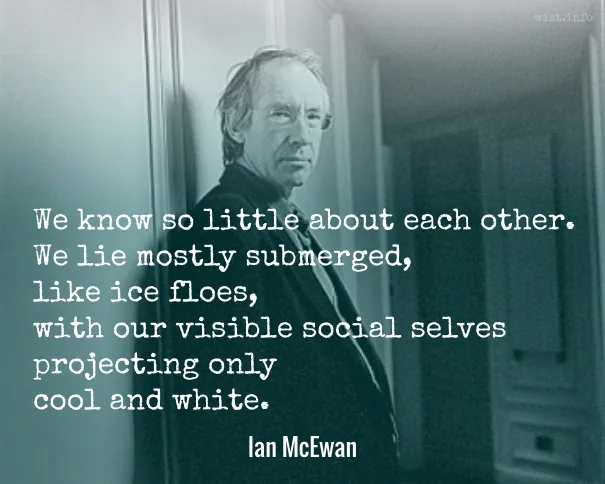If one’s thoughts were written on one’s face, many would need masks.
Minna Antrim (1861-1950) American epigrammatist, writer
Naked Truth and Veiled Allusions (1902)
(Source)
Quotations about:
mask
Note not all quotations have been tagged, so Search may find additional quotes on this topic.
You see, there’s a fundamental connection between seeming and being. Every Fae child knows this, but you mortals never seem to see. We understand how dangerous a mask can be. We all become what we pretend to be.
Patrick Rothfuss (b. 1973) American author
The Name of the Wind, ch. 92 “The Music That Plays” [Bast] (2007)
(Source)
The difference between narcissism and self-love is a matter of depth. Narcissus falls in love not with the self, but with an image or reflection of the self — with the persona, the mask. The narcissist sees himself through the eyes of another, changes his lifestyle to conform with what is admired by others, tailors his behavior and expression of feelings to what will please others. Narcissism is eye trouble, voluntary blindness, an agreement to keep up appearances (hence the importance of “style”) and not to look beneath the surface.
Sam Keen (b. 1931) American author, professor, philosopher
The Passionate Life, ch. 8 (1983)
(Source)
As for Comedy, it is (as has been observed) an imitation of men worse than the average; worse, however, not as regards any and every sort of fault, but only as regards one particular kind, the Ridiculous, which is a species of the Ugly. The Ridiculous may be defined as a mistake or deformity not productive of pain or harm to others; the mask, for instance, that excites laughter, is something ugly and distorted without causing pain.
[ἡ δὲ κωμῳδία ἐστὶν ὥσπερ εἴπομεν μίμησις φαυλοτέρων μέν, οὐ μέντοι κατὰ πᾶσαν κακίαν, ἀλλὰ τοῦ αἰσχροῦ ἐστι τὸ γελοῖον μόριον. τὸ γὰρ γελοῖόν ἐστιν ἁμάρτημά τι καὶ αἶσχος ἀνώδυνον καὶ οὐ φθαρτικόν, οἷον εὐθὺς τὸ γελοῖον πρόσωπον αἰσχρόν τι καὶ διεστραμμένον ἄνευ ὀδύνης.]
Aristotle (384-322 BC) Greek philosopher
Poetics [Περὶ ποιητικῆς, De Poetica], ch. 5 / 1449a (c. 335 BC) [tr. Bywater (1909)]
(Source)
Original Greek. Alternate translations:Comedy is, as we have said, an imitation of characters of a lower type -- not, however, in the full sense of the word bad, the ludicrous being merely a subdivision of the ugly. It consists in some defect or ugliness which is not painful or destructive. To take an obvious example, the comic mask is ugly and distorted, but does not imply pain.
[tr. Butcher (1895)]Comedy is, as we stated, the portrayal of an inferior class, yet not in all their inferiority, being the ludicrous side of ugliness abstracted. Ludicrousness is the painless and non-destructive variety of the species ugliness of the genus failing; thus, e.g., a ludicrous countenance is ugly and distorted, but not painful.
[tr. Margoliouth (1911)]Comedy, as we have said, is a representation of inferior people, not indeed in the full sense of the word bad, but the laughable is a species of the base or ugly. It consists in some blunder or ugliness that does not cause pain or disaster, an obvious example being the comic mask which is ugly and distorted but not painful.
[tr. Fyfe (1932), sec. 3.4]Comedy is, as we said, a representation of people who are rather inferior -- not, however, with respect to every kind of vice, but the laughable is [only] a part of what is ugly. For the laughable is a sort of error and ugliness that is not painful and destructive, just as, evidently, a laughable mask is something ugly and distorted without pain.
[tr. Janko (1987), sec. 2.4]Comedy is, as we said, a mimesis of inferior persons not however that it has to do with the whole range of wickedness but with what is funny -- an aspect of ugliness. A funny thing, to be precise, is a clumsy mistake that is not painful or destructive: or to take an obvious example, the comic mask is ugly and grotesque but not repulsive or painful.
[tr. Whalley (1997)]Comedy, as we said, is an imitation of people of a lower sort, though not in respect to every vice; rather, what is ridiculous is part of what is ugly. For the ridiculous is a certain sort of missing the mark and a deformity that is painless and not destructive; an immediate example is the comic mask, which is something deformed and misshapen without causing pain.
[tr. Sachs (2006)]Comedy is, as we said, representation of people who are inferior but not wholly vicious: the ridiculous is one category of the embarrassing. What is ridiculous is some error embarrassment that is neither painful nor life-threatening; for example, a comic mask is ugly and distorted but does not cause pain.
[tr. Kenny (2013)]
It’s a terrible thing to be alone — yes it is — it is — but don’t lower your mask until you have another mask prepared beneath — As terrible as you like — but a mask.
Katherine Mansfield (1888-1923) New Zealander writer, poet [pen name of Kathleen Mansfield Murry (née Beauchamp)]
Letter to John Middleton Murry (Jul 1917)
(Source)
Young people, who are still uncertain of their identity, often try on a succession of masks in the hope of finding the one which suits them — the one, in fact, which is not a mask.
W. H. Auden (1907-1973) Anglo-American poet [Wystan Hugh Auden]
“One of the Family” (1965), Forewords and Afterwords (1973)
(Source)
Every man has three characters — that which he exhibits, that which he has, and that which he thinks he has.
Alphonse Karr (1808-1890) French journalist and novelist
A Tour Round My Garden [Voyage autour de mon jardin] (1851)
(Source)
Are all men in disguise except those crying?
Daniel "Dannie" Abse (1923-2014) Welsh poet
Poem (1986), “Encounter at a greyhound bus station,” Ask the Bloody Horse
(Source)
Almost every man wastes part of his life in attempts to display qualities which he does not possess, and to gain applause which he cannot keep.
Samuel Johnson (1709-1784) English writer, lexicographer, critic
The Rambler, #189 (7 Jan 1752)
(Source)
No one shows himself as he is, but wears his mask and plays his part. Indeed, the whole of our social arrangements may be likened to a perpetual comedy; and this is why a man who is worth anything finds society so insipid, while a blockhead is quite at home in it.
[Allerdings zeigt Keiner sich wie er ist, sondern Jeder trägt eine Maske und spielt eine Rolle. — Ueber haupt ist das ganze gesellschaftliche Leben ein fortwährendes Komödienspielen. Dies macht es gehaltvollen Leuten insipid; während Plattköpfe sich so recht darin gefallen.]
Arthur Schopenhauer (1788-1860) German philosopher
Parerga and Paralipomena, Vol. 2, ch. 26 “Psychological Observations [Psychologische Bemerkungen],” § 315 (1851) [tr. Saunders (1890)]
(Source)
(Source (German)). Alternate translation:It is quite certain that no one shows himself as he is, but that each wears a mask and plays a role. In general, the whole of social life is a continual comedy, which the worthy find insipid, whilst the stupid delight in it greatly.
[tr. Dircks (1897)]No one reveals himself as he is; we all wear a mask and play a role.
[tr. Hollingdale (1970)]It is certain that no one shows himself as he is, but everyone wears a mask and plays a part. Generally speaking, the whole of our social life is the continuous performance of a comedy. This renders it insipid for men of substances and merit, whereas blockheads take a real delight in it.
[tr. Payne (1974)]
Celebrity is a mask that eats into the face. As soon as one is aware of being “somebody,” to be watched and listened to with extra interest, input ceases, and the performer goes blind and deaf in his overanimation. One can either see or be seen.
Look at a man in the midst of doubt and danger, and you will lean in his hour of adversity what he really is. It is then that true utterances are wrung from the recesses of his breast. The mask is torn off; the reality remains.
Man is least himself when he talks in his own person. Give him a mask, and he will tell you the truth.
We become so accustomed to disguise ourselves to others that at last we are disguised to ourselves.
[Nous sommes si accoutumés à nous déguiser aux autres qu’enfin nous nous déguisons à nous-mêmes.]
François VI, duc de La Rochefoucauld (1613-1680) French epigrammatist, memoirist, noble
Réflexions ou sentences et maximes morales [Reflections; or Sentences and Moral Maxims], ¶119 (1665-1678) [tr. Bund/Friswell (1871)]
(Source)
Appeared in the 1st edition (1665). Another 1665 variant began "La coutume que nous avons de nous déguiser aux autres, pour acquérir leur estime, fait qu’enfin … [The custom we have of disguising ourselves to others, in order to gain their esteem, means that finally…]"
(Source (French)). Alternate translations:We are so used to dissemble with other People, that in time we come to Deceive and Dissemble with our selves.
[tr. Stanhope (1694), ¶120]We were so used to disguise ourselves to others, that at last we become disguised even to ourselves.
[pub. Donaldson (1783), ¶102; ed. Lepoittevin-Lacroix (1797), ¶116]We are so used to disguise ourselves to others, that at last we become disguised to ourselves.
[ed. Carvill (1835), ¶91]We are so much accustomed to disguise ourselves to others, that at length we disguise ourselves to ourselves
[ed. Gowens (1851), ¶122]We spend so much time deceiving others that we end by deceiving ourselves.
[tr. Heard (1917), ¶119]We are so accustomed to adopting a mask before others that we end by being unable to recognize ourselves.
[tr. FitzGibbon (1957), ¶119]We get so much in the habit of wearing a disguise before others that we finally appear disguised before ourselves.
[tr. Kronenberger (1959), ¶119]We are so used to disguising ourselves from others that we end by disguising ourselves from ourselves.
[tr. Tancock (1959), ¶119]So accustomed do we become to disguising ourselves from others that, at length, we disguise ourselves from ourselves.
[tr. Whichello (2016) ¶119]
Compare this to ¶373:We sometimes shed tears which at first deceive only others, but in the end deceive ourselves also. [tr. Stevens (1939), ¶373]
No man, for any considerable period, can wear one face to himself, and another to the multitude, without finally getting bewildered as to which may be the true.
Nathaniel Hawthorne (1804-1864) American writer
The Scarlet Letter, ch. 20 “The Minister in a Maze” (1850)
(Source)
See La Rochefoucauld.






















